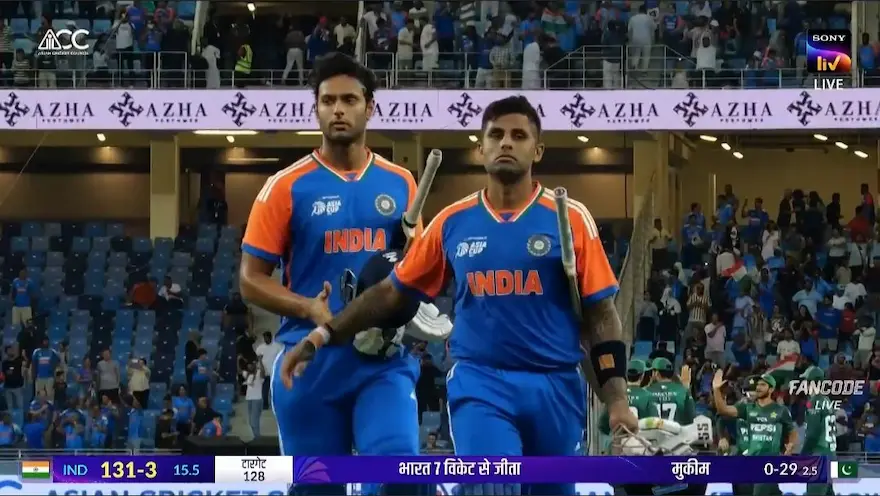
India skips handshakes after Asia Cup win over Pakistan, sparking debate on sportsmanship, silent protest, and national sentiment amid rising tensions (photo-X)
India’s Silent Protest Sparks Asia Cup Handshake Controversy – India’s emphatic win over Pakistan in the Asia Cup 2025 was overshadowed by a post-match controversy that has stirred debate across cricketing circles and diplomatic corridors. The Indian team not only skipped handshakes with Pakistani players but also reportedly refused to greet match officials, shutting their dressing room door and sending a message that went far beyond the scoreboard.
The Match That Ended in Silence
Asia Cup Handshake Controversy– On September 14, 2025, India defeated Pakistan by seven wickets in a Group A clash at the Dubai International Stadium. Led by Suryakumar Yadav, the Indian team chased down Pakistan’s modest total of 127/9 in just 15.5 overs, with Yadav remaining unbeaten on 47. It was a clinical performance, showcasing India’s dominance with both bat and ball.
But what happened after the final ball drew more attention than the match itself.
As per tradition, players from both sides usually exchange handshakes to show sportsmanship. However, after hitting the winning six, Suryakumar and Shivam Dube walked straight to the dressing room. Pakistani players, including captain Salman Ali Agha and coach Mike Hesson, waited on the field for the customary gesture—but the Indian dressing room door was reportedly shut.
Even match officials, including referee Andy Pycroft, were left without acknowledgment. The silence was not accidental, it was deliberate, and it sparked immediate backlash.
Pakistan’s Protest and the Spirit of Sports
The Pakistan Cricket Board (PCB) lodged an official complaint with the match referee, calling India’s actions “against the spirit of sports”. Salman Ali Agha skipped the post-match presentation in protest, and coach Mike Hesson expressed disappointment publicly, saying, “We were ready to shake hands. It’s disappointing that the opposition didn’t reciprocate”.
Former Pakistani pacer Shoaib Akhtar also weighed in, urging both sides to separate politics from sport. “It is a cricket match. Don’t make it political. Show some grace,” he said on a sports channel.
The PCB’s statement emphasized that no directive was issued to skip post-match formalities, even though players were advised not to shake hands at the toss. The absence of a handshake was seen as a snub not just to Pakistan, but to the spirit of cricket itself.
India’s Stand: A Gesture of Solidarity, Not Hostility
India’s silence wasn’t without context. Earlier this year, a terror attack in Pahalgam claimed 26 lives, prompting India to launch Operation Sindoor, targeting militant camps in Pakistan and Pakistan-occupied Kashmir. The match took place amid calls for a boycott, with many Indian fans questioning why the game was allowed to proceed.
Captain Suryakumar Yadav addressed the issue during the post-match press conference. “We stand by the families affected by the Pahalgam tragedy and dedicate this win to our armed forces,” he said. “Some things are beyond sportsmanship”.
Sources within the Indian team confirmed that the decision to skip handshakes was made before the match, in alignment with the Board of Control for Cricket in India (BCCI) and government sentiment. The team viewed the gesture not as disrespect, but as a symbolic act of national solidarity.
Even in previous matches, Suryakumar had refrained from handshakes with the UAE captain, suggesting a consistent stance during the tournament.
Cricket, Conflict, and the Power of Symbolism
This incident highlights the complex relationship between sport and politics especially in the context of India-Pakistan ties. Cricket has often served as a bridge between the two nations, but it has also mirrored their tensions.
Here’s what this moment reveals:
- Sport is not immune to national sentiment: Players are ambassadors, and their actions reflect public mood.
- Symbolic gestures matter: A handshake or the absence of one, can carry diplomatic weight.
- Cricket diplomacy is fragile: While fans crave unity, real-world events often shape what happens on the field.
- The role of governing bodies: The BCCI and PCB must now navigate the fallout, balancing protocol with principle.
For many Indian fans, the team’s decision was a quiet tribute to the victims of terror. For Pakistani supporters, it felt like a breach of cricketing courtesy. And for neutral observers, it was a reminder that sportsmanship and sovereignty sometimes collide.
Final Thought
India’s refusal to shake hands wasn’t just about cricket, it was about conscience. In choosing silence over ceremony, the team made a statement that resonated far beyond the boundary ropes. Whether one sees it as defiance or dignity, it’s clear that in 2025, cricket is no longer just a game, it’s a reflection of who we are, what we stand for, and how we choose to respond when the world is watching.
Also read: Ajinkya Rahane’s Graceful Exit: Mumbai’s Captain Bows Out to Shape Cricket’s Future
Stay informed with the latest news and updates – only on Rapido Updates.